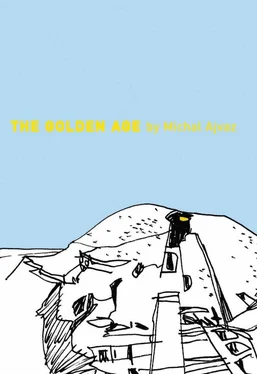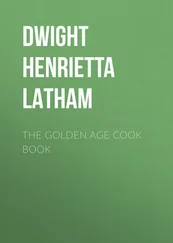Michal Ajvaz - The Golden Age
Здесь есть возможность читать онлайн «Michal Ajvaz - The Golden Age» весь текст электронной книги совершенно бесплатно (целиком полную версию без сокращений). В некоторых случаях можно слушать аудио, скачать через торрент в формате fb2 и присутствует краткое содержание. Год выпуска: 2010, Издательство: Dalkey Archive Press, Жанр: Современная проза, на английском языке. Описание произведения, (предисловие) а так же отзывы посетителей доступны на портале библиотеки ЛибКат.
- Название:The Golden Age
- Автор:
- Издательство:Dalkey Archive Press
- Жанр:
- Год:2010
- ISBN:нет данных
- Рейтинг книги:4 / 5. Голосов: 1
-
Избранное:Добавить в избранное
- Отзывы:
-
Ваша оценка:
- 80
- 1
- 2
- 3
- 4
- 5
The Golden Age: краткое содержание, описание и аннотация
Предлагаем к чтению аннотацию, описание, краткое содержание или предисловие (зависит от того, что написал сам автор книги «The Golden Age»). Если вы не нашли необходимую информацию о книге — напишите в комментариях, мы постараемся отыскать её.
is Michal Ajvaz’s greatest and most ambitious work.
The Golden Age
The Golden Age — читать онлайн бесплатно полную книгу (весь текст) целиком
Ниже представлен текст книги, разбитый по страницам. Система сохранения места последней прочитанной страницы, позволяет с удобством читать онлайн бесплатно книгу «The Golden Age», без необходимости каждый раз заново искать на чём Вы остановились. Поставьте закладку, и сможете в любой момент перейти на страницу, на которой закончили чтение.
Интервал:
Закладка:
It seemed to me that the germs of dark worlds were present on the island in the breath of all things, sounds and words. As I was reading the history of the kingdom of Devel, I got to thinking about what it was that all those years ago so bewitched the European conquerors that they forgot their homelands within three generations, that they, too, came to hear voices in the island’s murmurs; I thought about the faces and figures that appeared to them in the play of the foam and the leaves. Were they really overwhelmed by the placidity of the islanders, or did they — experts on power and violence that they were — scent evil hidden at the bottom of this placidity and capitulate in admiration of its grand style? But I would be doing the islanders an injustice if I were to find in their calm, non-violent nature only the seeds of cruelty. I have said already that the force that ruled their world was woven from many sub-forces, and that each of these could separate itself from the bunch. It was possible to find in the islanders’ world the germs of many attitudes and many worlds, celestial and infernal. Images from these worlds sometimes flashed through in the islanders’ gestures and the melody of their voices. (For example, I was able to imagine very well that the admirable precision of their eyes — which was able to recognize and record the finest distinctions in shape — could be used in the development of brilliant analytical thinking.)
Families flee from Devel in ever-greater numbers. There are voices on the island’s beaches and light signals out at sea. Many of the fugitives find asylum at the court of Illim. Here a plan is hatched to invade the island ruled by the mad princess and her guard. The émigrés invite Tana to lead their flotilla, but Tana refuses: he does not want to renew the hostilities between families that was extinguished by the love of Gato and Hios, and also he is grateful for the gemstone, thanks to which Nau is now almost as soft as before (apart from the skin of her face, which has remained hard and is like a gleaming mask of metal).
The émigrés form themselves into opposing groups; each has its own candidate for commander of the army and its own plans for the invasion, which it is not prepared to give up. The groups reach no consensus until the unexpected appearance on Illim and in the Book —introduced in a subordinate clause right at the end of a very long compound sentence dealing with the fragrance of the old walls of Illim’s harbour — of Ara, whom the reader has believed would always remain in a kind of Book -world Hades into which characters descend from pages read. Above her name there is a thick pocket, probably detailing what happened to Ara after her departure from the palace at Devel. I did not open this because I was anxious to find out how the invasion of Devel would end, and quite simply I forgot to go back to it. I very much regret this, as Karael once told me that the adventures of Ara were among the most beautiful passages in the Book —she told me that Ara meets voiceless birds on her travels, which instead of singing, play long musical compositions by tapping their beaks on dripstones of differing thicknesses that grow at the mouths of caves in the hillside and give tones of different pitches. Perhaps the émigrés suspect that their planned strategy would be no match for the power of Hios, brewed as it is in a witch’s cauldron of pain, beauty, cruelty, desire, tenderness and madness. It seems they recognize in the words and gestures of Ara a power that is born of sweetness, nightmares and stifled cries; they understand that this night-time torrent of courage and evil is capable of confronting Hios and the dark army she commands.
So it comes to pass one starless night that all ships of the invading force push off from the harbour at Illim and out to sea. Ara is aboard the command ship, watching the flashing of the white, red and blue signal lights on all sides. The darkness begins to change to a grey mist, through which the outlines of dozens of phantom-like sails can be seen. (I meditated on what Ara would actually be able to see from the bow of her ship. I imagined a forest of masts in various shades of grey. But the Book was so indefinite in its references to time, in the boldness or carelessness with which it mixed the props of various ages, and by the dearth of words its authors employed in describing the main shapes of things — even though it was able to describe over dozens of pages the adornments on a house facade or the network of cracks in the plaster of an old wall — that out of the mist of dawn there might just as well have emerged the funnels of steamers. Or perhaps the ships slid lightly through the waves powered by some marvellous fuel unknown to our world — perhaps the milk of the silver mountain tiger was bubbling in the glass cauldron of a magical engine room.) The mist before the bow is an ever-thickening, ever-expanding pall of dark-grey, which suddenly develops cracks to reveal the streets of Devel’s capital. Ara wades through the cold water. All around her, grey figures step out, plunging their feet into the wet sand of the beach. Out of the mist comes the clank of metal and screaming. Ara and the others climb the steep lanes of the harbour area, which she knows well from her childhood. The lanes open out into a square, where dreadful monuments rise out of the mist. The mist is filled with points and blades of metal; as if in a dream, Ara beats these off with dagger and sword.
By midday the invading forces have broken down the gates of the palace. Dagger in hand, Hios joins the battle in the corridors of the palace, incurring many wounds and killing many of the enemy. After the death of the commander of the praetorian guard it becomes clear that the palace is about to fall. Hios leaves the action by a secret corridor and goes into the palace park, where she sets the golden theatre in motion. This is the first time a performance has been given to an empty auditorium. Devel’s princess sits there alone and stares rapt at the golden images of Gato’s demise. She has left a trail of blood in her wake and Ara has followed this to the theatre. Then the unknown author described a scene that might have been from a film: for a long time Hios and Ara, each armed with a long dagger, engage in wordless, hand-to-hand combat, threading their way up and down the empty aisles of the amphitheatre. Two slim bodies, which once would join in nights of love, move to the dumb dance of death in front of revolving scenes of Gato’s death and rebirth, death and rebirth. Steel daggers flit about before the golden dumbshow; the ringing of metal mixes with the thud of the wings of the door as they slam together and the purr of the mechanism that drives the turntable. At last Hios falls in the aisle between two rows of seats. Ara wipes her dagger on Hios’s clothes and goes back to the palace, where a great victory celebration is in preparation. Before an empty auditorium, Gato dies and comes back to life in the golden statue again and again. That evening someone stops the mechanism that drives the statues of the theatre, but Hios lies among the seats in a pool of dried blood for several days more. There was no mention of whether her shadow and Gato’s were embracing in the underworld.
Ara briefly serves as queen of Devel, but then she leaves the island and sets out on new adventures that take her to a great many lands. (These were described in another part of the Book .) Meanwhile, on Devel and Illim two boys from other sides of the feuding families have grown to maturity, and one day a new war breaks out between the two islands…
Journey’s end
So ended the story of Tana and Nau, Taal and Uddo, Fo and Mii, Gato, Hios and Ara — one of the many episodes of the transforming, disappearing Book , one of the works of art created by the islanders, or perhaps a constellation of thousands of works of art, in which the reader forever encounters new books and fragments of old books no longer in existence and lost to the past like the fragile scrolls of the Egyptians. But the reader also encounters sonatas and symphonies for string, wind, water and fire instruments, and ballets, in which the dancers are people, animals, phantoms and mechanical dummies; and he encounters statues made of water and jelly, pictures painted on canvas, in sand and in water, mosaics composed of gemstones, luminous beetles and hallucination-inducing lights.
Читать дальшеИнтервал:
Закладка:
Похожие книги на «The Golden Age»
Представляем Вашему вниманию похожие книги на «The Golden Age» списком для выбора. Мы отобрали схожую по названию и смыслу литературу в надежде предоставить читателям больше вариантов отыскать новые, интересные, ещё непрочитанные произведения.
Обсуждение, отзывы о книге «The Golden Age» и просто собственные мнения читателей. Оставьте ваши комментарии, напишите, что Вы думаете о произведении, его смысле или главных героях. Укажите что конкретно понравилось, а что нет, и почему Вы так считаете.












